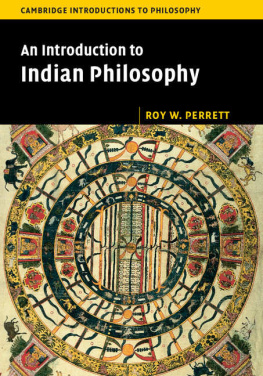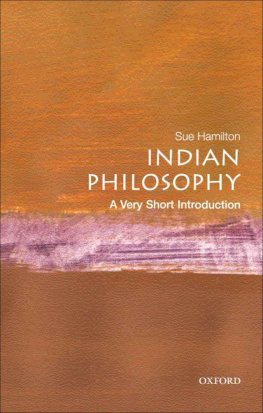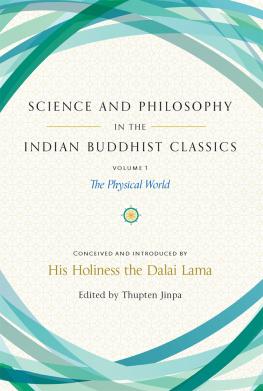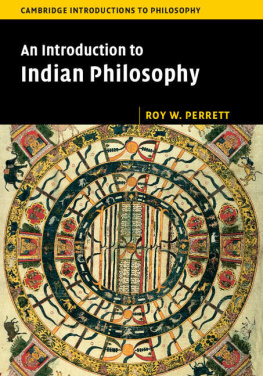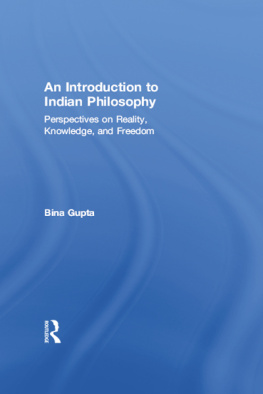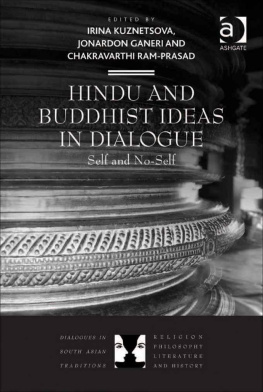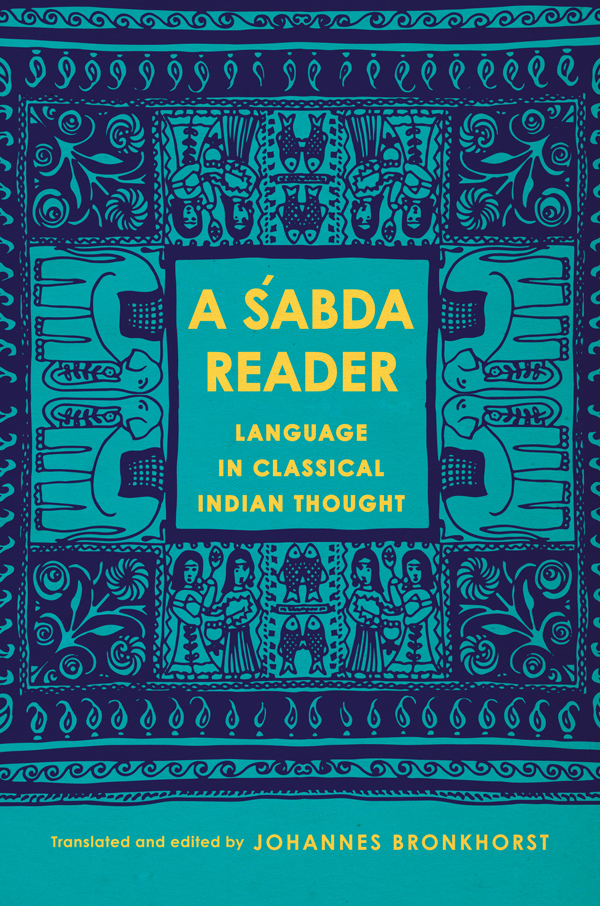Contents
Guide
Pagebreaks of the print version
A ABDA READER
Historical Sourcebooks in Classical Indian Thought
HISTORICAL SOURCEBOOKS IN CLASSICAL INDIAN THOUGHT
The Historical Sourcebooks in Classical Indian Thought series provides text-based introductions to the most important forms of classical Indian thought, from epistemology, rhetoric, and hermeneutics to astral science, yoga, and medicine. Each volume offers fresh translations of key works, headnotes that orient the reader to the selections, a comprehensive introduction analyzing the major lines of development of the discipline, and exegetical and text-critical endnotes as well as extensive bibliography. A unique feature, the reconstruction of the principal intellectual debates in the given discipline, clarifies the arguments and captures the dynamism that marked classical thought. Designed to be fully accessible to comparativists and interested general readers, the Historical Sourcebooks also offer authoritative commentary for advanced students and scholars.
A Rasa Reader: Classical Indian Aesthetics , Sheldon Pollock
A Dharma Reader: Classical Indian Law , Patrick Olivelle
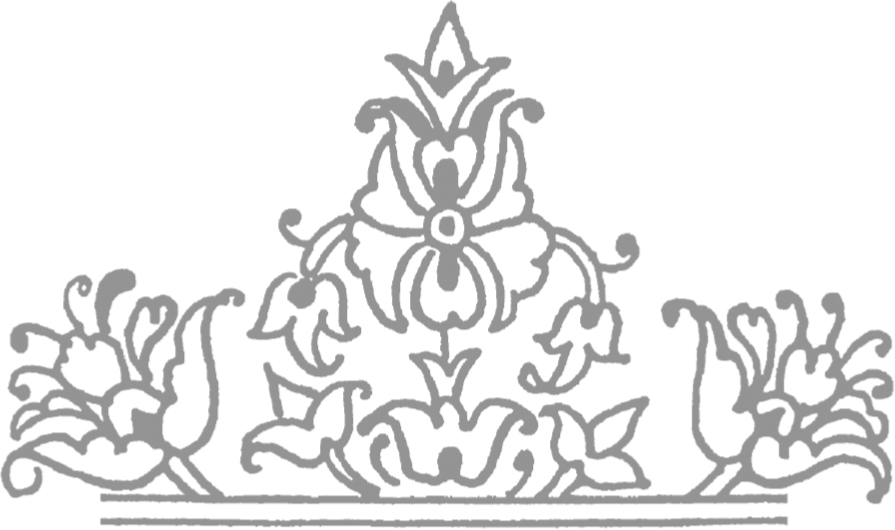
A abda Reader
LANGUAGE IN CLASSICAL INDIAN THOUGHT
Translated and edited by
JOHANNES BRONKHORST

COLUMBIA UNIVERSITY PRESS
NEW YORK

Columbia University Press wishes to express its appreciation to the Andrew W. Mellon Foundation of New York for its contribution toward the publication of this book and its support for the Historical Sourcebooks in Classical Indian Thought series.
Columbia University Press
Publishers Since 1893
New York Chichester, West Sussex
cup.columbia.edu
Copyright 2019 Columbia University Press
All rights reserved
E-ISBN 978-0-231-54831-1
Copyright 2019 Columbia University Press
All rights reserved
Library of Congress Cataloging-in-Publication Data
Names: Bronkhorst, Johannes, 1946- editor, translator.
Title: A sabda reader : language in classical Indian thought / translated and edited by Johannes Bronkhorst.
Description: New York : Columbia University Press, [2019] | Series: Historical sourcebooks in classical indian thought | Includes bibliographical references and index.
Identifiers: LCCN 2018029025 (print) | LCCN 2018058349 (ebook) | ISBN 9780231189408 (cloth : alk. paper)
Subjects: LCSH: Philosophy, Indic. | Semantics (Philosophy) | Language and languagesPhilosophy. | Hindu philosophy. | Buddhist philosophy. | Jaina philosophy. | Sanskrit languagePhilosophy. | Vedic languagePhilosophy. | IndiaLanguagesPhilosophy.
Classification: LCC B132.S4 (ebook) | LCC B132.S4 S228 2019 (print) | DDC 409.34dc23
LC record available at https://lccn.loc.gov/2018029025
A Columbia University Press E-book.
CUP would be pleased to hear about your reading experience with this e-book at .
Cover design: Jennifer Heuer
Contents
While I was preparing this book, it soon became clear that much of what should be covered by the subtitle Language in Classical Indian Thought does not easily lend itself to presentation in the format of a reader. Too many topics in this area have been understudied and are far from being correctly understood by modern scholarship. The texts are often technical and obscure, and they frequently create more confusion than understanding at a first reading. Even longtime study does not always guarantee a full grasp of these texts.
I try to resolve this difficulty in the following manner. A number of topics that are crucial for an understanding of the historical role of language in Indian thought can only be hinted at in this reader (mainly in the introduction). Some of these have received fuller treatment in my book How the Brahmins Won (Brill 2016; esp. IIA.4, III.34). Readers who look for fuller documentation are advised to refer to that publication.
In the present volume, the sections of the introduction (), in the sense that, for example, section I.1 and II.1 deal, on the whole, with the same or similar topics. This correspondence is not, however, perfect. An example is section I.3, which deals with the grammarian Patajali, whereas section II.3 presents passages from both Patajalis work and more recent texts that deal with the same or similar issues.
Readers may further keep in mind that in this volume I have tried to resist the temptation of cherrypicking, i.e., of choosing topics on the basis of their similarity to or relevance for modern language philosophy. On the contrary, I have tried to bring out the importance that language has in Indian thought in many or most of its forms, irrespective of whether the Indian notions might or should interest a modern philosopher.
The most serious mistake a modern reader can make is to assume that Indian philosophers were just like modern philosophers, the main difference being that they lived many centuries ago, in India, and expressed themselves in different languages, mainly Sanskrit. This would be overlooking the fact that most human activities, including philosophizing, are profoundly embedded in the beliefs, presuppositions, and expectations that characterize the culture and the period in which they take place. The French historian Lucien Febvre used in this connection the expression outillage mental , mental equipment, different for people living in different ages. Atheism in the modern sense of the term, Febvre points out in his book Le problme de l incroyance au XVIe sicle, was simply unthinkable in sixteenth-century Europe: people did not have the mental equipment to conceive of it.
Quite independently of the question whether Febvres claim is correct in its full generality, this example should discourage us from entering too easily into a discussion with Indian thinkers on our terms. Like the Europeans of the sixteenth century, they had many beliefs, presuppositions, and expectations of which they were perhaps not or only partly aware, and for them too there may have been ideas they could not conceive of. More precisely perhaps, they might have understood those new ideas if someone had presented them, but since this did not happen, the ideas never crossed their minds.
Febvres observation concerns a belief that seemed essential to thinkers of sixteenth-century Europe: the existence of (a) God. Thinkers of classical India were less convinced that there is only one possible position on this particular issue; many of them felt quite comfortable with the idea of a world without creator God. Among their presuppositions we rather find the deep conviction that language and reality are deeply intertwined. Language is for them rarely, if ever, a marginal philosophical issue. Quite the contrary: more often than not, ideas about language are the very basis of their philosophies. The remainder of this book will illustrate this.
This takes us back to the relation between classical Indian and modern philosophers, and to the rather obvious observation that a discussion with a philosopher who lived many centuries ago is bound to be a one-sided affair. The ancient philosopher may have had all the intelligence needed to come to terms with ideas that a modern philosopher might propose to him, but alas, he is dead. The modern scholar is in a more advantageous position: he can learn to understand the ancient thinkers on their own terms, if only he is open to it and willing to make the effort. This too will be attempted in this book.


